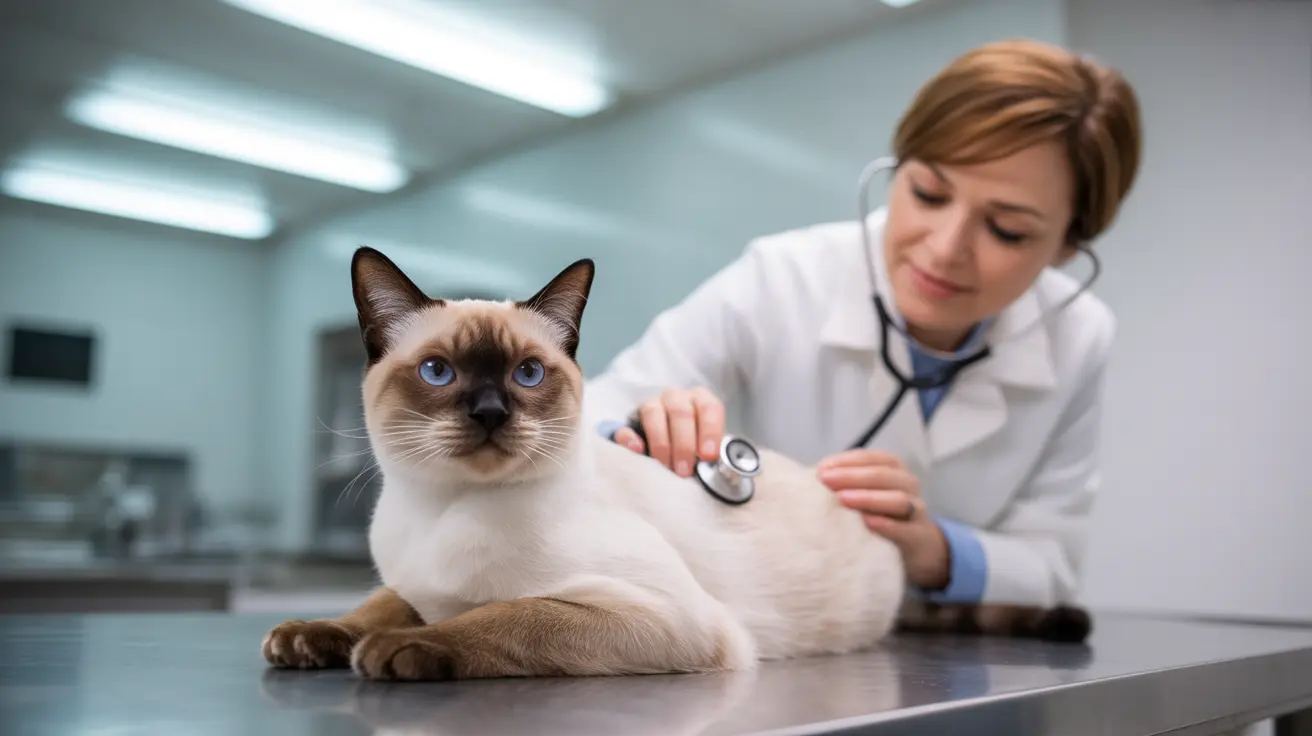When it comes to the elegant and distinctive Flame Point Siamese cat, understanding their potential health challenges is crucial for providing optimal care. These striking felines, known for their cream-colored bodies and reddish-orange points, share many health considerations with traditional Siamese cats while requiring specific attention to certain breed-associated conditions.
As a Flame Point Siamese owner or prospective adopter, being informed about these health issues can help you provide proactive care and recognize early warning signs. Let's explore the key health concerns affecting these beautiful cats and learn how to best support their well-being throughout their lives.
Common Eye Disorders in Flame Point Siamese Cats
Eye problems are particularly prevalent in Flame Point Siamese cats, with several hereditary conditions requiring attention:
Progressive Retinal Atrophy (PRA)
This inherited condition causes gradual vision loss, beginning with night blindness and potentially progressing to complete blindness. Early signs typically appear between 1.5-2 years of age, though some cats may show symptoms as early as 2-3 weeks old. While there's no cure, early detection helps families adapt their environment to support affected cats.
Strabismus and Nystagmus
Many Flame Point Siamese cats exhibit crossed eyes (strabismus) or involuntary eye movements (nystagmus). While often benign, these conditions should be evaluated by a veterinarian to rule out underlying issues and ensure proper vision function.
Respiratory Health Concerns
Respiratory issues are another significant health consideration for Flame Point Siamese cats:
Asthma and Bronchial Disease
These cats show a higher predisposition to asthma and bronchial conditions. Symptoms include coughing, wheezing, and difficulty breathing. Management typically involves:
- Environmental allergen control
- Medication (including inhalers when necessary)
- Regular veterinary monitoring
- Avoiding triggers like smoke and strong fragrances
Gastrointestinal and Digestive Issues
Megaesophagus and Motility Problems
Flame Point Siamese cats can inherit conditions affecting their digestive system, particularly megaesophagus – an enlargement of the esophagus that causes difficulty swallowing and regurgitation. Early identification and appropriate feeding strategies are essential for managing these conditions.
Inflammatory Bowel Disease (IBD)
This breed may be more susceptible to IBD and chronic gastritis. Watch for symptoms like:
- Chronic vomiting
- Diarrhea
- Unexplained weight loss
- Changes in appetite
Behavioral and Neurological Conditions
Compulsive Behaviors
Flame Point Siamese cats may exhibit certain behavioral issues, particularly pica (the consumption of non-food items) and wool-sucking behavior. These conditions require environmental management and sometimes behavioral therapy to prevent complications.
Vestibular Disease
Some Flame Point Siamese cats may experience vestibular disease, affecting their balance and coordination. Signs include head tilting, circling, and unusual eye movements. Prompt veterinary care is essential when these symptoms appear.
Preventive Care and Management
Maintaining the health of your Flame Point Siamese requires a comprehensive approach:
- Regular veterinary check-ups (at least annually)
- Dental hygiene routine including brushing and professional cleanings
- Environmental enrichment to prevent stress-related behaviors
- Proper nutrition tailored to their specific needs
- Regular exercise and mental stimulation
Frequently Asked Questions
What are the most common health problems seen in flame point Siamese cats?
The most common health issues include eye disorders (PRA, strabismus), respiratory problems (asthma), gastrointestinal conditions, and behavioral issues like pica. Regular veterinary check-ups can help monitor and manage these conditions effectively.
How can I recognize and manage progressive retinal atrophy (PRA) in my flame point Siamese?
Early signs of PRA include night blindness, bumping into objects in dim light, and dilated pupils. While there's no cure, early detection allows for environmental adaptations and support strategies to maintain quality of life.
Why are flame point Siamese cats more prone to respiratory issues like asthma, and how can I help prevent them?
Their genetic makeup makes them more susceptible to respiratory conditions. Prevention includes maintaining clean air quality, avoiding triggers like smoke and strong fragrances, and regular veterinary monitoring.
What specific dental care does a flame point Siamese need to avoid periodontal disease?
Regular tooth brushing with cat-specific toothpaste, annual professional cleanings, and dental-friendly treats can help prevent periodontal disease. Early intervention is key to preventing more serious health issues.
How can I reduce the risk of behavioral issues such as pica in my flame point Siamese?
Provide plenty of environmental enrichment, remove hazardous items (strings, wool), ensure adequate exercise and mental stimulation, and consider puzzle feeders to keep them engaged. Consult a veterinarian if persistent pica occurs.
By understanding and proactively addressing these health concerns, you can help ensure your Flame Point Siamese enjoys a long, healthy, and happy life. Remember to work closely with your veterinarian to develop a personalized health care plan that addresses your cat's specific needs.






